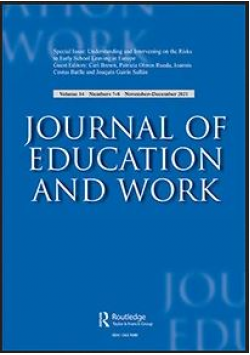
Special issue: Understanding and Intervening on the Risks to Early School Leaving in Europe
Year: 2021Authors: Ceri Brown, Patricia Olmos Rueda, Ioannis Costas Batlle & Joaquín Gairín SallánLink: https://www.tandfonline.com/toc/cjew20/34/7-8?nav=tocListKeywords:
Among other contributions, four papers within this special issue draw upon findings generated from the EU Erasmus+ funded Orienta4YEL project, an international three-year research study that aims to understand and intervene on Early Leaving within 48 educational settings across key regions in five nations in Europe. All five countries involved in the Orienta4YEL project1; Spain, Romania, Portugal, Germany and UK – currently a non-member country – remain among these 11 Member States. Focusing on the ESL rates for 2019 for these specific countries, Spain is at 17.3%; (the highest ESL rate in Europe although one of the countries that report the largest reduction – in percentage point terms – in the last five years) and Romania is at 15.3%; (this latest rate for 2019 was 4.0 percentage points higher than the target). These countries were furthest from the ESL benchmark by 2020. The three remaining nations hold comparable ESL rates, closer to the EU benchmark. These include; Germany at 10.3% (which reports increases of less than 1.0 points in the last five years); Portugal at 10.6% (which also reports the largest reduction – in percentage point terms – in the last five years as Spain) and the UK at 10.9% (although the UK uses the comparative indicator of young people not in Employment, Education or Training (NEET) which problematises easy comparison, as will be discussed in paper five of this issue). The differences among the countries involved in the Orienta4YEL study may be due to multiple causes and/or factors. For example, differences could be related to; countries’ smaller/greater levels of social differences and regional disparities; the effectiveness of educational systems in relation to dropout; the nature and effectiveness of dropout control systems; as well as educational systems – especially VET systems – being accused of being somewhat rigid and extremely school-based, skills mismatches.
![[DEV] Orienta4YEL](https://www.orienta4yel.eu/public/img/logo-horizontal.svg)






